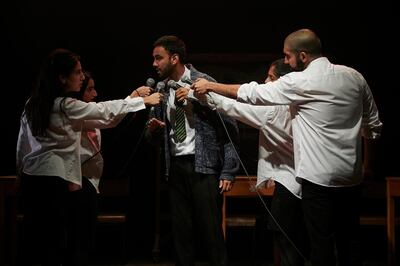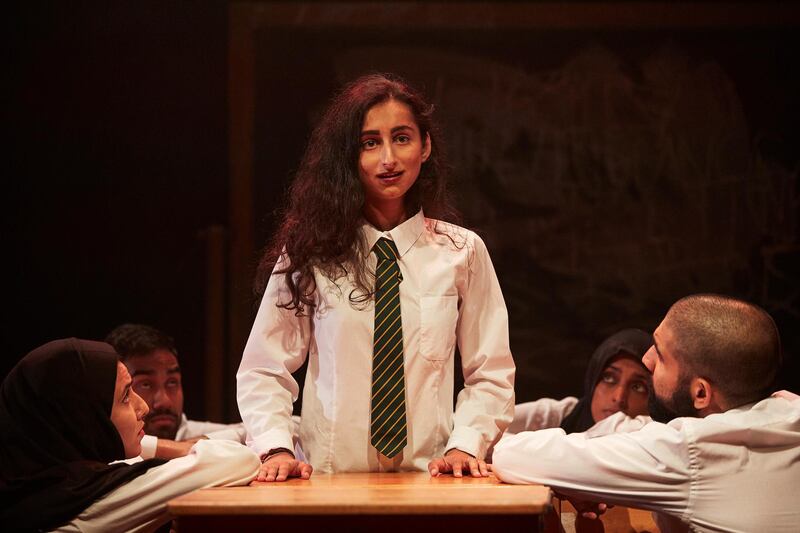It was an education scandal played out on the front page of newspapers and that raised fears of extremists infiltrating British schools in Muslim-majority neighbourhoods. The most controversial play at this year's Edinburgh Festival Fringe seeks to re-examine one of the most bitter scandals in recent years: the Trojan Horse affair.
The saga began in March 2014, when a letter detailing an alleged plot for what the United Kingdom media called the “Islamisation of British schools” was leaked to the mainstream press. The letter, titled “Operation Trojan Horse”, was supposedly written by a conspirator in Birmingham, who boasted of having already changed the leadership at four schools in the city and named another 12 that had been identified as vulnerable to such a takeover. It was later revealed that several former teachers had raised concerns to local authorities that an extreme ethos was being pushed into state schools.
While the letter itself has since been widely discredited as fake, its consequences, as well as complaints from whistle-blowers, were far-reaching. During the next two years, the Trojan Horse scandal, as it quickly became known, was rarely out of the press.
Then education secretary Michael Gove sent a former counter-terror chief to investigate the claims in schools across Birmingham. A subsequent government report found that there had been a "sustained, co-ordinated agenda to impose segregationist attitudes and practices of a hardline, politicised strain of Sunni Islam" in several schools in Birmingham.
Created by documentary theatre company Lung, the Edinburgh show Trojan Horse aims to challenge the findings of the government inquiry. Writers Helen Monks and Matt Woodhead conducted more than 200 hours of interviews, with about 80 people involved in the scandal, including teachers, pupils, politicians and civil servants, to try to uncover the truth behind the headlines.
"We started with a very open mind. You make an assumption that if there has been a government inquiry into something, there's something in it," Monks, 25, tells The National.
"We went and did a couple of preliminary interviews, not even sure whether it would go anywhere," explains Woodhead, also 25. "But the more interviews we did, we seemed to scratch away at the surface. There were these absolutely gigantic allegations about jihadis indoctrinating children, and yet we were not finding any evidence that supported that. We found a very different story was there."
Trojan Horse the play tells a very different story to the one shown in the government report. Focusing on five main characters, the writers use direct quotes from pupils, teachers and governors to question the existing narrative. It takes a sympathetic approach to the teachers who were accused of radicalising children, as well as Tahir Alam, who was then chairman of the trust that oversaw three schools in Birmingham.
Alam was banned from involvement in schools after the government found he had undermined "fundamental British values". It highlights the disruption the inquiry had on pupils at one of the schools, Park View, where the GCSE pass rate dropped from more than 70 per cent before the affair to about 40 per cent in 2016.

But while Trojan Horse falls firmly on the side of the accused, the retelling is nuanced. A voice is given to the whistle-blowers whose concerns about parent-led intrusion forcing a radical agenda into schools are given a fair hearing. The play also doesn't skirt around the issue of a now infamous WhatsApp group chat in which some of the teachers at Park View school made offensive comments about Jewish people and questioned the validity of terror attacks such as the Boston Marathon bombings.
Fundamentally, the play concludes that blame lies with the Conservative government of the time and their policy of taking power away from local authorities and placing it into the hands of parents and governors. It asks: is it a surprise in schools where 98 per cent of the pupils are Muslim that parents would push for more prayer rooms, recruit Muslim teachers and introduce a call to prayer?
Monks and Woodhead say they want to "punch up, rather than down" and show how the community suffered from a saga that was blown out of all proportion by a heavy-handed government keen to appear tough on extremism.
"There's a lot of division in Birmingham," says Monks, who went to school in the city. "We try to understand it and cover it from lots of different angles and create a prism of voices.
“The blame and the racism are institutional, rather than personal, and lie with the government and with Gove.”
Trojan Horse is at the Edinburgh Festival Fringe until Sunday
_________________
Read more:
Comedian Eshaan Akbar on trying to highlight the humour in Islam
What does it take to be a successful stand-up comedian?
One joke at a time: how the Arab world is (slowly) tickling its funny bone
_________________











